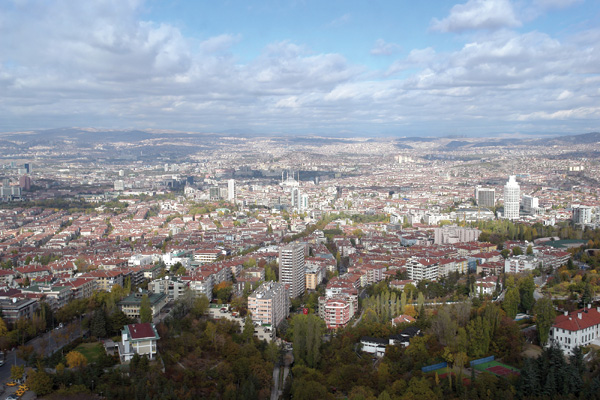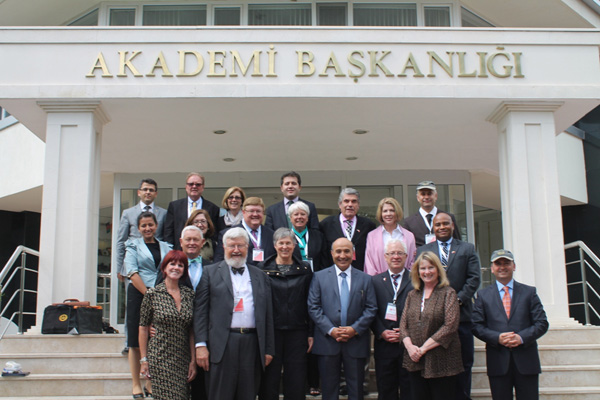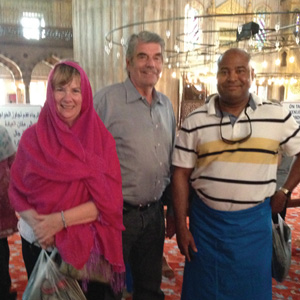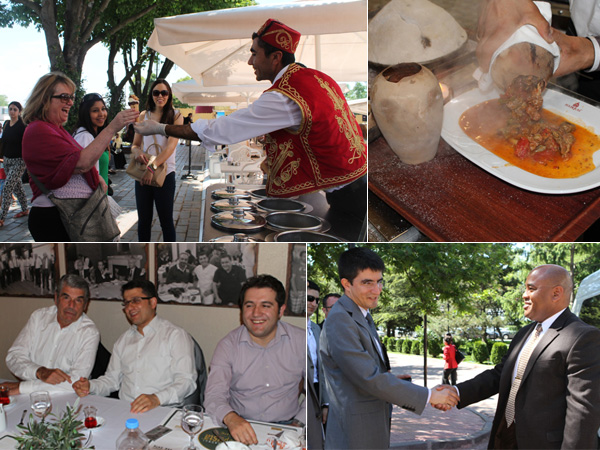
“The world is globalizing and law is universalizing.” So begins a letter from the Justice Academy of Turkey to selected American judges who were invited to Turkey in June to exchange knowledge with Turkish judges and prosecutors in training.
Some urgency attended the message. Turkey has been reforming its judicial system for a decade, not least to advance its goal of joining the European Union. Concerns cited by the European Commission and the U.S. State Department include judicial independence, weak procedural rights for defendants, and excessive pretrial detention linked to huge case backlogs.
Into that milieu entered nine American judges from six states, including three judges of the Court of Appeals of Indiana: Ezra H. Friedlander, Patricia A. Riley and Rudolph R. Pyle III. Their itinerary included formal presentations at the Justice Academy of Turkey, official meetings with Turkey’s High Council of Judges and Prosecutors, and tourist visits to the famed city of Istanbul.

“From the moment we touched down, we were busy,” Pyle said. “We were on the go constantly.”
First stop: The capital city of Ankara, where students fresh from college prepare for judicial and prosecutorial careers at the Justice Academy of Turkey. Those deemed qualified are then appointed to posts throughout the country, which has a unified court and legal system.
The American judges delivered nine presentations over two days, on such topics as judicial ethics (Riley), civil trial mediation (Friedlander) and privacy and crime prevention (Pyle).
Their audiences—largely young and majority male—asked incisive questions across a range of topics, but seemed particularly curious about the persistence of American capital punishment, which Turkey abolished in 2004.
“They didn’t back down,” Riley said. “Their questions were very engaging.”
The Turkish and American legal systems are starkly different. “Plea agreements are foreign over there, jury trials don’t exist, mediation doesn’t exist,” Pyle said.

Perhaps most notably, the Turkish system is inquisitorial, not adversarial. Turkish judges and prosecutors coordinate criminal investigations and fact-finding and even sit together on the bench. “Their trials can last one to two years,” Pyle said. “It’s apples to oranges.”
But the judges were favorably impressed by Turkey’s electronic records and case management systems, which are accessible throughout the country by computer or smart phone, and by judges, attorneys and litigants.
“That was very impressive,” Friedlander said. “We can’t get the state of Indiana on one (records) system. But we work from the bottom up; they work from the top down.”
Turkey’s National Judicial Network Project is among a laundry list of reforms initiated or approved since 2002, according to Judge M. Uzeyir Karabiyik, of the Turkish Ministry of Justice. Writing in the Summer 2012 issue of the International Judicial Monitor, published by the Washington, D.C.-based International Judicial Academy, Karabiyik described judicial professionalism and training as central elements of broader judicial reforms.
To that end, a number of Turkish judges are enrolled in Master of Laws (LL.M.) programs at American law schools, including Michigan State University. One such MSU student, Judge Orhan Karabacak, met the entire Court of Appeals at its annual retreat this year in South Bend and also greeted Judges Riley, Pyle and Friedlander in Turkey.
Because Turkey would like to expand the number of American law schools hosting its students, Friedlander has shared information between his Turkish hosts and Indiana University’s two law schools, including the Center on Constitutional Democracy at IU Maurer School of Law. “(The Turks) would like to expand and I thought it’d be good for them to know about us,” he said.

The judges’ cross-cultural exchanges ranged far beyond judicial systems and practices. Their trip coincided with mass demonstrations in Ankara and Istanbul and police actions to suppress them. Judge Riley, who arrived in Ankara June 1, described the acrid smell of tear gas as her driver negotiated detours around the chaos. She also observed police use of water cannons against protesters.
“When we went through those streets, we kept sneezing and crying, and it was the tear gas,” she said.
Neither Riley nor the others ever felt unsafe, although their hosts did move their hotel accommodations away from the center of the Ankara protests.
Nor did the experience jaundice their views of Turkey or Turks, who showered them with hospitality. “I don’t know how rock stars are treated,” Friedlander said, “but they couldn’t be treated any better than we were.”